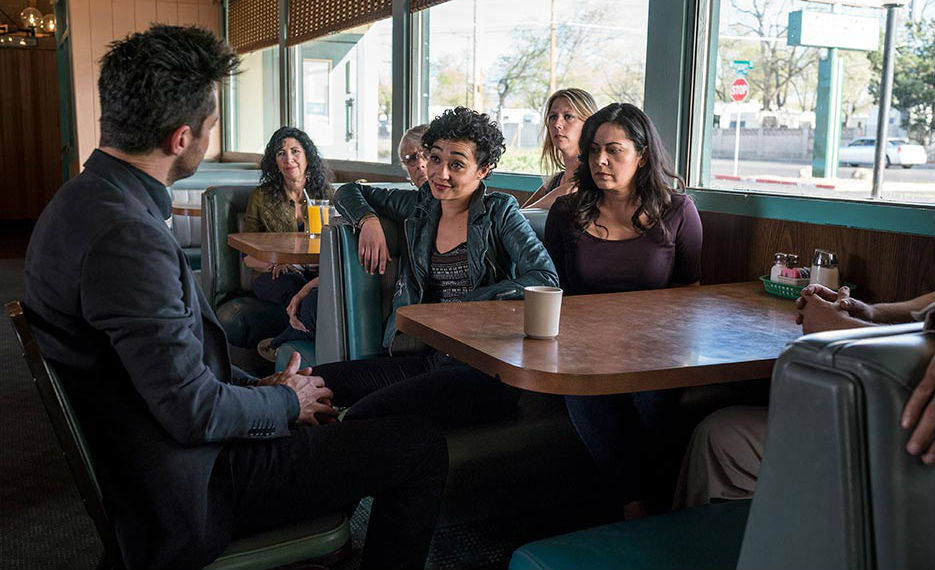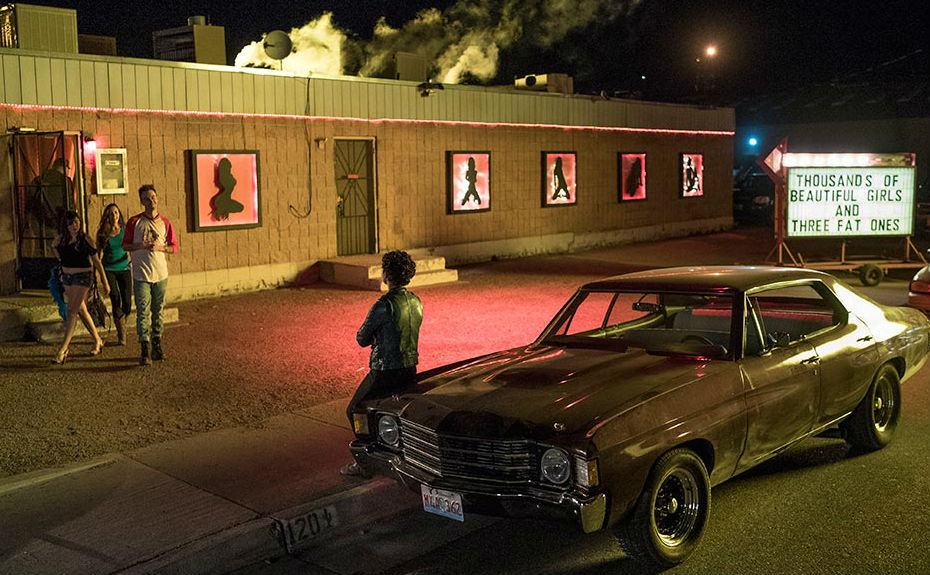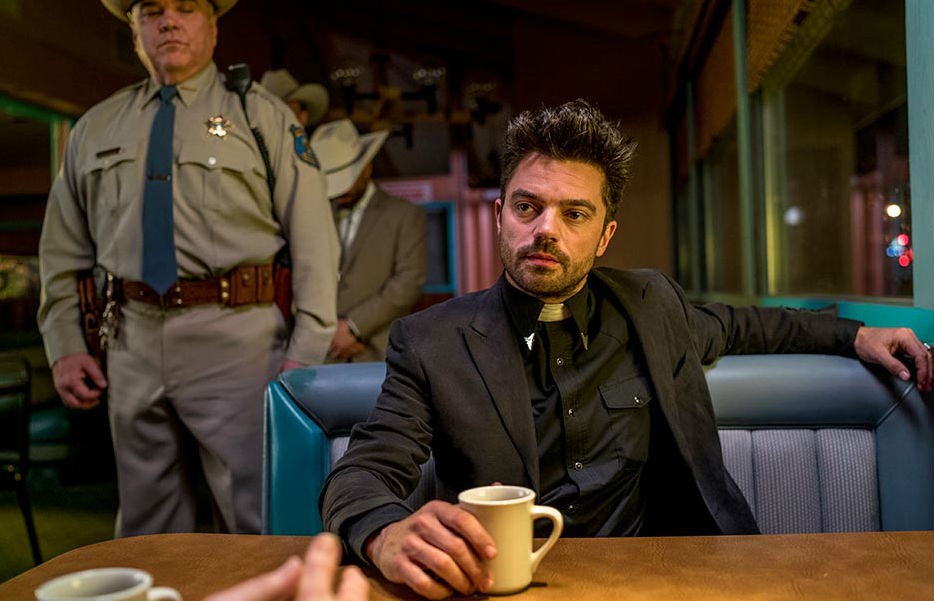Why you can trust GamesRadar+
Here’s the rule every writing teacher lays out to budding storytellers: no character pees. Snide college freshman thinking they’re super clever love to contradict the idea because of course your characters pee. They’re people, so they pee and a scene of them peeing can absolutely work. What the student is missing in this perennial dialogue is the lesson that storytellers can’t waste time. If something is happening in the story, it has to serve a purpose, whether it’s informing character or pushing the plot forward or just setting the tone. No character pees because typically them peeing isn’t the most interesting thing going on in their world. No one making Preacher learned this lesson. Smack in the middle of South Will Rise Again, season one’s exact halfway point, Preacher just stops dead for someone to relieve themselves for no tangible reason. Here in a single moment is everything wrong with the show’s first season: it spends the majority of its time showing us the least interesting moments in its characters lives, flitting between them with the attention span of a mayfly.
In a better show, the scene of someone peeing might actually work. After bouncing between more detailed and portentous scenes of Jesse ministering to his flock at a diner and the long lost cowboy from episode two’s cold open, the story shifts to Emily. It’s okay if you don’t remember Emily, Jesse’s second hand at the church. Already the show’s most boring character, the equivalent of a walking, talking Eggo waffle, we join Emily for a scene where she cleans up Jesse’s living quarters at the church and stops halfway through to relieve herself. While using the bathroom, Tulip shows up, intrudes on Emily’s privacy and asks where Jesse is. Emily seems pretty freaked out and Tulip seems annoyed to find a woman in Jesse’s home. Were the romance between Tulip and Jesse backed up by any on screen chemistry between Ruth Negga and Dominic Cooper, maybe this would have worked; or maybe some sparks between Lucy Griffiths’ Emily and Cooper; or if there was any sense of urgency behind Tulip’s revenge plot that Jesse refuses to take part in; or if this scene felt like it affected anything else in the entire episode. It doesn’t. It’s just a scene where someone talks to someone else for a second while they pee.
The rest of the episode doesn’t follow the bathroom visits or Jesse Custer, Cassidy the vampire, the wayward angels trying to extract the power that’s inhabited Jesse, poor Arsface-d Eugene, the captivating meat man Odin Quincannon or Donny the bully, last seen being forced to eat a gun by Jesse in episode three. It does, however, bounce between all of them with manic frequency. Sticking with the inattentive pattern set by previous episodes, there’s a hell of a lot happening in South Will Rise Again but it doesn’t add up to much of anything.
Cassidy has a brief discussion with Tulip about the realities of vampirism that starts charming and a chuckle worthy before it inexplicable shifts into Cassidy hitting on Tulip and insisting there’s something between them. Tulip laters robs a pharmacy to lure Cassidy into helping her get her revenge with the promise of hard drugs and what is arguably the least erotic sex scene in television history. This is another ugly on-screen relationship that might work were it grounded in established characters, but both Cassidy and Tulip act out of sorts here. The Tulip of past episodes would rather die than surrender herself to some strange man like she does here while perpetual coward Cassidy avoids trouble wherever it appears. Why would he follow his penis and his addictions into someone like Tulip who met him by throwing him out a second story window? It’s bad writing and more wasted time.

Jesse meanwhile leans hard into his new powers, solving the problems of his flock by responding to every spiritual and terrestrial problem with a firm, supernaturally backed, “Don’t worry about it!” He even deploys his power to convince hostile townsfolk to stop being so horribly cruel to poor disfigured Eugene—who continues to be the heart of those barren show thanks to the performance of Ian Colletti—while Jesse’s would-be nemesis Donny starts to realize that the reverend is more than he appears to be. Were Jesse a more likable character, some of these moments might be enough to make South Will Rise Again likable despite its chaotic and flummoxing pacing as it jumps between all these characters. As it is, though, it seems to just set up even more subplots for Preacher to leave unresolved as it fails to reveal its core story.
At least one part of episode five is a success, even though it’s completely divorced from the scenes in Annville. This week’s cold open returns to the adventures of Stoic Beard Cowboy in the 19th Century. Yes, three weeks after the last cowboy cold open, he’s back and picking up right where he left off wandering into the frontier town Ratwater to get medicine for his sick child. Why would Preacher set up a story in a different timeline in its second episode only to ignore for a full third of the season and then pick it right back up with no explanation? Because that’s just how Preacher does things, sloppy and unintelligible. All that said, though, the scenes in Ratwater are absolutely mesmerizing in their cruelty. As with the last time this still unnamed character, a civil war veteran as explained by the bastards he meets in Ratwater explain, showed up, fans of the Preacher comics will be delighted by the sequence’s accuracy in depicting a classic figure. In the show, it’s just a glimpse of what looks like a way, way better show.

Unfortunate as it is to say, South Will Rise Again suggests Preacher isn’t going to fix its biggest problems before the end of season one. Its frittered away half a season on trying to create atmosphere and shocking viewers rather than actually telling a story with characters that are, if not likable, at least fascinating. The only reason to keep watching from here is to see how Jesse’s powers result in Monkey’s Paw-like unintended consequences as with old Odin Quincannon “serving God” as the preacher commanded in the episode’s final scene. Even moments like that, though, are just so many scenes of characters peeing.




